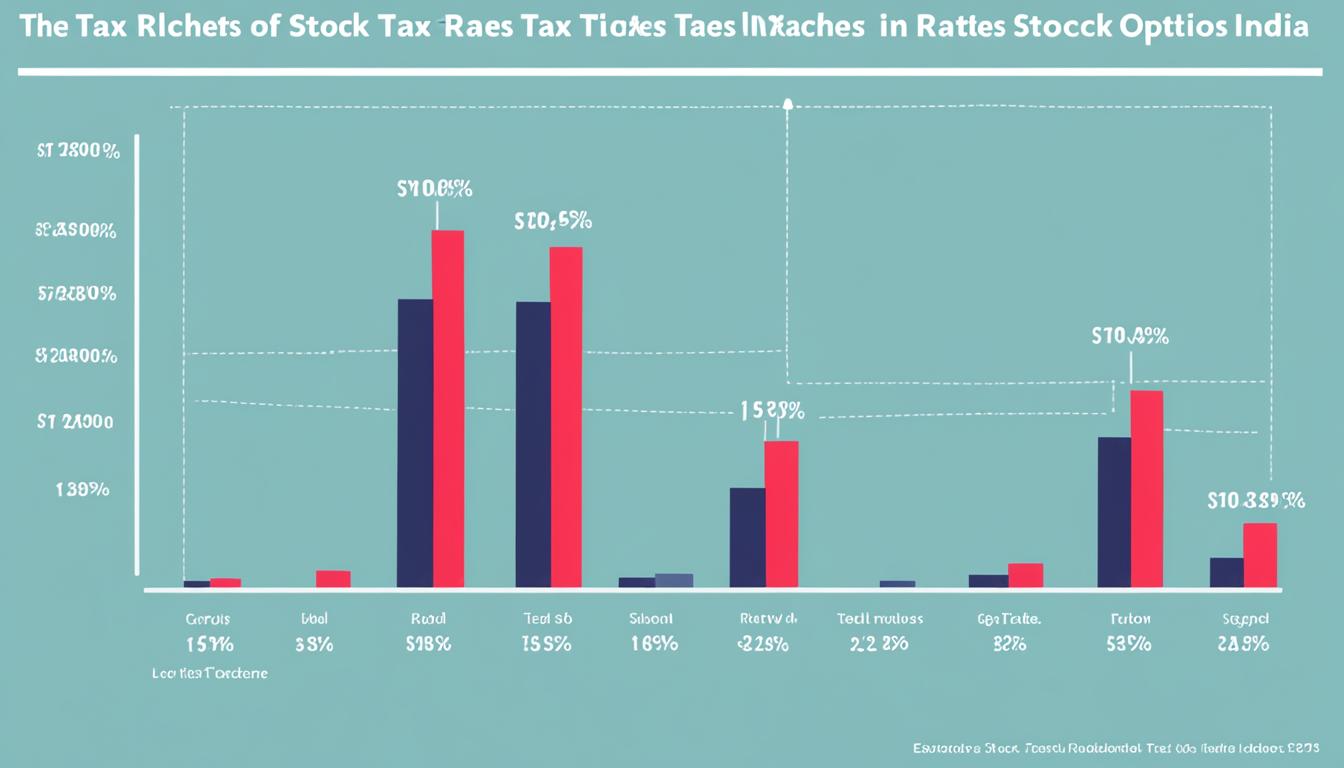Hyderabad , India
What if the key to your financial freedom lies within the complexities of tax legislation? It’s vital for employees and employers to grasp the taxation of stock options in India. The Finance Minister’s recent announcements on raising taxes on long-term and short-term capital gains are significant.
This Stock Option Taxation Guide will delve into how these tax reforms affect our investments and pay. High trading costs are making many traders think about moving abroad. This highlights the need for clear rules on stock option taxation for businesses.
Key Takeaways
- Taxation changes affect both short-term and long-term capital gains significantly.
- Rising SEC transaction taxes are a concern for retail traders.
- Only 1% of traders pay LTCG, affecting primarily high net worth individuals.
- Relocation of traders to countries with lower taxes is on the rise.
- Understanding stock option taxation is vital for informed financial planning.
Introduction to Taxation of Stock Options
The rules for taxing stock options in India have changed, making things more complex. It’s vital to grasp the Stock Options Tax Law to understand these changes. Stock options given to employees come with tax rules that can lead to big Tax Implications of Stock Options.
New tax rates on capital gains have been raised, like a 12.5 percent for long-term gains on financial and non-financial assets. There’s also a 20 percent tax on short-term gains. These changes aim to fix tax rate issues across different assets, as noted by Neelkanth Mishra from Axis Bank.
These changes affect more than just regular investments. The angel tax now adds complexity for startups and investors in India. It’s important to understand these tax laws to see how they impact investors and businesses using stock options for employee pay.
For more details on how these tax changes affect traders and investors in India, check out this article here.
What are Stock Options?
Stock options give employees the chance to buy company shares at a set price, called the exercise price. This encourages employees to help the company succeed. It also links their financial goals with those of the company’s owners. Knowing how stock options work is key, especially when it comes to tax rules that affect employee benefits.
Vesting is a big part of stock options. It’s the time when employees get the right to use their stock options. After vesting, employees can exercise their options, following their job agreement rules.
Let’s explain some important terms related to stock options:
- Exercise Price: The set price for buying company shares.
- Vesting Period: The time an employee waits before they can use their stock options.
- Market Price: The current price of the company’s shares on the market.
Understanding stock options helps both companies and employees make better choices about rewards and financial planning. The balance between potential earnings from stock options and tax rules is complex. For startups in India, these factors are key to keeping employees happy and on board.
Understanding the Taxation of Stock Options
It’s crucial for both employees and employers to understand the tax rules for stock options. These rules can be complex and affect financial planning. We’ll look at how taxes work at different stages of stock options, focusing on what employees and employers need to do.
Tax Treatment for Employees
Employees face tax issues when they exercise options and sell shares. When they exercise options, they might pay tax on the share’s market value minus the exercise price. This is seen as part of their salary and is taxed at the income tax rate.
When selling shares, employees could face capital gains tax. Shares sold within a year are taxed as short-term gains, while those sold after a year are taxed as long-term gains. Now, short-term gains are taxed at 20%, and long-term gains at 12.5%. Knowing these rules helps with planning taxes on stock options.
Tax Implications for Employers
Employers also need to understand the tax side of stock options. Giving options as part of pay can be beneficial but comes with tax duties. Companies must record the cost of options in their finances, which can change their profits and taxes.
How an employee stock option plan is designed can boost motivation and keep employees. But, it also brings tax issues that need careful thought. Staying on top of the law and knowing the financial effects is key to good pay plans.
| Tax Event | Tax Rate for Employees | Tax Rate for Employers |
|---|---|---|
| Exercising Options | Perquisite Tax based on market value | Expense recognition in financial statements |
| Short-term Capital Gains (held | 20% | Potential increased corporate tax |
| Long-term Capital Gains (held > 1 year) | 12.5% | Impact on employee retention strategies |
Knowing about these tax matters is key to managing your finances well. At Am Accountable, we offer virtual accounting services for startups in India. Our team can help match your financial plans with the details of stock options, making tax planning easier for your business. For more information, call us at 91 91778 42756 or email info@amaccountable.com. You can also set up a free discovery call at www.amaccountable.com.
Types of Stock Options
Stock options in India come in different types for various purposes and people. We mainly see two main kinds: Incentive Stock Options (ISOs) and Non-Qualified Stock Options (NSOs). Knowing about these is key to understanding how stock options are taxed and the effects on employee taxes.
Incentive Stock Options (ISOs) are given to employees and have good tax benefits. With ISOs, we can buy shares at a set price, called the exercise price. If we keep the shares for a certain time after buying, we get taxed at lower long-term rates. This can save us a lot of tax and encourages us to stay with the company.
Non-Qualified Stock Options (NSOs) can go to employees, contractors, and board members. They don’t have the same tax benefits as ISOs but give companies more freedom in setting pay. When we exercise NSOs, they are taxed as regular income. This can mean paying more tax if the stock price is high.
Here’s a look at how ISOs and NSOs differ, including their tax effects:
| Feature | Incentive Stock Options (ISOs) | Non-Qualified Stock Options (NSOs) |
|---|---|---|
| Eligibility | Employees only | Employees, contractors, board members |
| Tax Treatment at Exercise | No ordinary income tax | Taxed as ordinary income |
| Long-term Holding Benefits | Lower capital gains tax | No special rate benefits |
| Exercise Price | Must be at least fair market value at grant | Can be below fair market value |
It’s important for employers and employees to know about these stock options. It affects their money decisions and pay plans. By understanding stock option taxes and employee stock option tax, we can make better choices that fit our financial goals.
Employee Stock Options Tax: An Overview
It’s crucial for employees to know about Employee Stock Options Tax if they get stock options as part of their job. This guide will cover who can get options and the rules about when they can use them. We’ll look at how these rules affect the taxes employees need to pay. The Stock Option Taxation Guide will help us understand this complex topic.
Eligibility Criteria for Employees
To get employee stock options, certain rules must be met. Employees need to have a job with the company offering the options. Things like the job they do, how long they’ve worked there, and their position might affect if they can get options. The main points are:
- Employment Status: You must be on the company’s payroll.
- Performance Metrics: Meeting certain goals might be needed for options.
- Type of Employment: Full-time jobs usually offer more options than part-time ones.
Expiry and Vesting Period Considerations
Knowing about expiry and vesting periods is key for tax planning. Vesting is when you wait before you can use your options. Expiry is when the option stops being valid. These ideas help us understand our tax duties better. Important points include:
- Vesting Period: This is the time you wait before using your options. It affects when you pay taxes.
- Expiry Conditions: Knowing when your options expire is important to avoid losing them.
- Tax Implications: Using options early or late can change how much tax you pay.

How eligibility, expiry, and vesting work together shapes the Employee Stock Options Tax. Looking at each part helps us understand our tax duties and how they match our financial plans.
Current Stock Option Taxation Rules in India
The rules for taxing stock options in India are changing, thanks to the Finance Bill. These changes affect both employees and employers. It’s important for everyone to know about these new rules to avoid fines.
One big change is the tax on short-term gains on listed equity going up to 20% from 15%. This will affect many people’s finances. Long-term gains on listed equity will also see a tax increase, from 10% to 12.5%. Non-financial assets will see tax changes too.
There’s also a plan to raise the exemption limit for capital gains on listed equity and equity funds to Rs 1.25 lakh per year. How long you hold assets matters; listed financial assets are long-term after 12 months. Unlisted financial and non-financial assets are long-term after 2 years.
In India, capital gains are split into short-term or long-term based on how long you hold them. If you sell listed equity shares within 12 months, it’s short-term. Unlisted shares are short-term if sold before 24 months. Long-term gains on listed equities are taxed at 10%, while unlisted shares are taxed at 20% with indexation benefits.
From October 1, 2024, ESOP buybacks will change. They will be taxed as dividend income, based on your income tax rate. This change will impact many, especially those in startups who have made a lot of money from ESOPs.
As these stock option tax rules change, it’s crucial for employees and businesses to keep up. Understanding these changes helps us manage our money better and stay in line with the law.
How the Finance Bill Affects Stock Option Taxation
The recent changes in the Finance Bill have big effects on Tax Implications of Stock Options. Now, capital gains taxes are more important. This means we need to look at how it affects both employees and employers. The tax for short-term capital gains on stocks is now 20%, up from 15%. This might make investors think about holding stocks for longer.
Long-term capital gains on stocks now have a 12.5% tax rate, up from 10%. This change affects investors and the whole market. The rule for capital gains on stocks has changed, making it clearer when gains are taxed. Now, stocks held for over 12 months are taxed differently than those held less than 12 months.
Unlisted bonds, debentures, and debt mutual funds are taxed at the same rate, no matter how long they’re held. These new rules, along with changes to indexation benefits, could change how people invest. We’ll see how these changes affect the market and how companies and employees handle stock options.
| Asset Type | Previous Tax Rate | New Tax Rate | Holding Period |
|---|---|---|---|
| Listed Equity (Short-Term) | 15% | 20% | Up to 12 months |
| Listed Equity (Long-Term) | 10% | 12.5% | Over 12 months |
| Unlisted Assets | Varies | Applicable rates | Over 24 months |
| Capital Gains Exemption Limit | Rs 1 lakh | Rs 1.25 lakh | N/A |
These updates in the Finance Bill are key for understanding stock options and their taxes. It’s crucial for companies and employees to stay informed to manage their taxes well.
Comparing Domestic and Global Stock Option Tax Laws
The way stock options are taxed varies a lot between India and the rest of the world. It’s key for Indian firms to know these differences to follow international rules. In our Stock Option Taxation Guide, we look at these differences and some important stats on India’s tax changes.
In India, taxes on long-term gains from stocks and other assets have gone up from 10% to 12.5%. Short-term gains now have a 20% tax rate, up from 15%. This affects employees who get stock options. Only about 1% of traders in India pay long-term capital gains tax, showing it mainly hits high net worth individuals (HNIs).
Worldwide, tax rates on stock options vary a lot. Many countries have lower taxes or special rules to encourage employees to own stock. India’s taxes on stock options are quite high, making it hard to keep good employees.
With taxes like the Securities Transaction Tax going up from 0.02% to 0.1%, some big traders are moving to places like Dubai, where taxes are lower. Retail investors are also facing more taxes and high costs, making some think about trading illegally.
The government’s policies show a big difference, offering low or no taxes to foreign traders in GIFT City but higher taxes to Indian traders. This makes Indian traders feel overburdened and limited compared to others abroad.
The latest Budget 2024 shows how investors might react to these changes. They might be less likely to accept buyback offers because of the budget’s focus on other areas rather than Karnataka, where Finance Minister Nirmala Sitharaman is from.
We’re committed to helping businesses understand stock option taxes with expert advice. Our guidance can help stakeholders make smart choices in this fast-changing tax world.
Tax Planning Strategies for Stock Options
Effective tax planning is key when dealing with stock options, especially for Employee Stock Options Tax. We’ll share strategies to make the most of tax deductions. These methods help both employees and employers improve their financial situation.
Maximising Tax Efficiency
To reduce tax on stock options, we suggest a few steps. First, knowing when to exercise options can save a lot of money. Exercising at the right time, like in low-income years, can help. It’s important to think about how options affect future taxes.
Utilising Tax Deductions
Tax deductions are a great way to cut down on taxes. Keeping track of deductions for professional expenses related to stock options is crucial. Also, documenting expenses from exercising options can lead to more savings. A smart approach to deductions can lessen the tax burden from Employee Stock Options Tax.
For more info on tax planning, check out resources that explain stock options management.
| Strategy | Description | Impact on Tax Liability |
|---|---|---|
| Timing of Exercise | Strategically exercising options in lower income years. | Potential reduction in income tax rates. |
| Long-Term vs Short-Term | Holding periods impact capital gains taxation. | Lower rates for long-term gains. |
| Active Expense Documentation | Recording all stock option-related expenses. | Maximises available deductions. |
Common Misconceptions about Stock Option Taxes
Many people think stock options don’t have tax implications until they are used. But, the truth is, taxes can come into play at different times, like when exercising or selling shares.
Some believe the exercise price doesn’t matter for tax. However, the difference between the exercise price and the market value at exercise is taxed as income. This is key for employees to know for their taxes.
It’s also thought that all stock options are taxed the same. But, Incentive Stock Options and Non-Qualified Stock Options have different tax rules. Knowing these differences helps in planning taxes better and avoiding surprises.
Some think stock options are only for big companies and top executives. But, many companies of all sizes use stock options to reward employees. So, all employees should understand the tax side of stock options.
For help with these complex tax issues, talking to accounting experts who know about stock option taxes is a good idea. Being aware of the tax rules helps both employees and employers make smart financial choices.
Conclusion
Understanding how Taxation of Stock Options works in India is key for employees and employers. It affects their financial planning. This article has covered the tax rules for Employee Stock Options, helping everyone make better financial choices.
It’s important to keep up with the latest laws and changes. These can change how we plan our finances. We suggest talking to experts and checking out resources like our page on stock options taxation in India for more help.
Getting to grips with Employee Stock Options Tax is vital. If you want a strong financial plan, get advice from professionals who know your situation well. At Am Accountable, we offer virtual accounting services for startups in India. This makes it easier for businesses to handle their finances.
FAQ
What are stock options?
Stock options give employees the chance to buy company shares at a set price, called the exercise price. They motivate employees to help the company grow and succeed.
How are stock options taxed in India?
In India, stock option taxes depend on when they are sold or exercised. Income from exercising options might be seen as salary. Selling shares can lead to capital gains tax.
What is the difference between Incentive Stock Options (ISOs) and Non-Qualified Stock Options (NSOs)?
ISOs offer better tax benefits under certain conditions. NSOs don’t have these benefits and are taxed as regular income when exercised. Knowing these differences helps with tax planning.
What are the eligibility criteria for stock options?
To get stock options, employees usually need to work full-time and meet certain performance or service conditions. It’s important for employees to know these rules to understand their benefits.
How do vesting and expiry periods affect tax obligations?
Vesting periods show when employees can use their stock options. Expiry periods tell them how long they have to use them. These periods affect tax obligations, as taxes can be due on exercise or expiry.
What recent changes in the Finance Bill might impact stock option taxation?
The Finance Bill has made changes that increase taxes on capital gains. This affects both long-term and short-term investments. It’s important for employees and employers to keep up with these changes to manage their investments well.
How can businesses plan for stock option taxation?
Businesses should understand the tax rules and regulations for stock options. They can plan by timing stock sales and using tax deductions to reduce tax burdens.
What are some common misconceptions about stock option taxes?
Some people think the tax impact is less than it is when exercising options, or they confuse different types of options. It’s key to clear up these misunderstandings to avoid financial and tax problems.
How do stock option taxation rules in India compare to those in other countries?
India’s stock option tax rules are different from those in other countries, especially in how they treat capital gains and the types of options. Knowing these differences can help Indian firms adopt international best practices.
Why is it important for employees to understand stock option taxation?
Employees need to understand stock option taxes to manage their money well and make smart choices about their options. Knowing the tax rules helps them plan their finances better.








